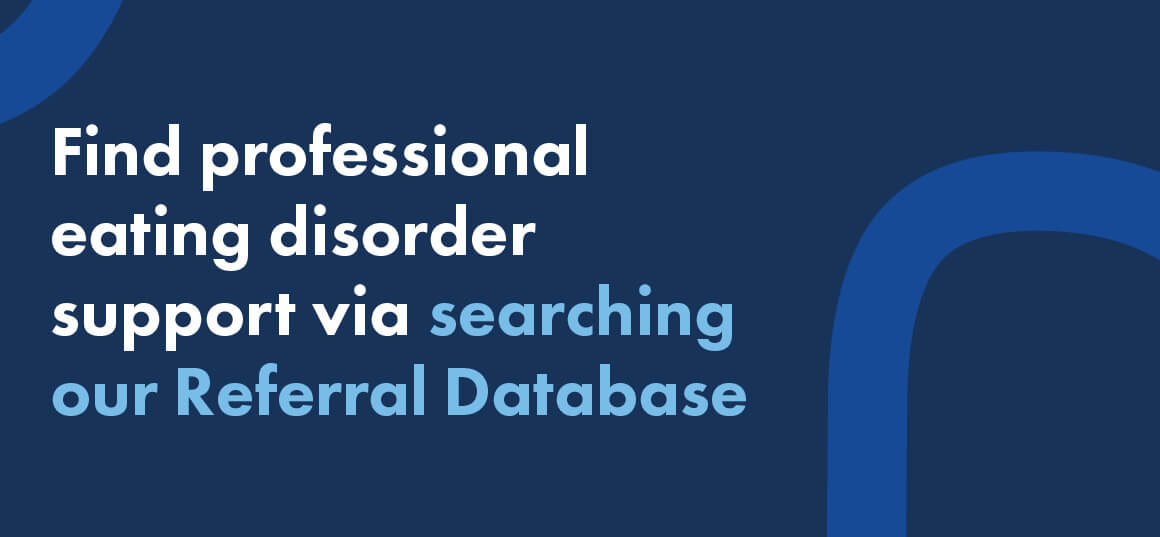Eating disorders in the workplace
With approximately one in five Australian workers experiencing a mental illness at any one time, there’s a chance someone in your workplace might be experiencing an eating disorder.
Many people with eating disorders will have perfectionist traits, leading them to be highly driven, competent and have a high level of attention to detail– often seen as ideal traits for employees. But even if an employee or colleague seems to be highly functioning, an eating disorder or disordered eating behaviours can take a great toll – not only on their work, but on their emotional and psychological health.
Eating disorders can result in lost productivity, but also long-term medical problems that can be life-threatening; eating disorders have one of the highest mortality rates for psychiatric illnesses.
Additionally, depending on how stress is managed, the workplace can serve as a bridge or a barrier to eating disorder recovery. While it’s not always possible to completely remove stress-related incidences from a workplace, it is possible to support employees or colleagues who might be struggling. Having a mentally healthy workplace is a benefit for everyone.
By recognising the signs and symptoms of eating disorders, you can also help your staff by encouraging them to seek help as soon as something might be wrong – early intervention can have a marked difference on an eating disorder’s severity and duration.
From creating a Body Kind workplace, to changing your language around food, dieting and bodies, here are our top tips for managing eating disorders in the workplace.
Create a workplace where everybody is treated with kindness – and avoid food, diet or body talk.
Research demonstrates several common workplace experiences, such as work events in which food is served, health incentives, and discussions of food or bodies, appear to intensify the stress people with eating disorders experienced at work.
Creating a body kind environment involves reducing diet and food talk at work, particularly in the lunchroom – you never know who might be impacted by what you’re saying.
Avoid commenting on other’s food choices, exercise routines or changes in their body. Even watch how you speak about your own body – when you make deprecating comments about yourself, you send the message that is where your body acceptance ends, for others too.
Avoid having food-centric events, such as meetings over food, unless absolutely necessary, and make sure staff have adequate breaks and enough time to eat meals.
If you need support in fostering a body positive workplace, book one of Butterfly’s workshops for corporates: Body Kind Workplaces. This one-hour session explores body image, disordered eating and eating disorders (with a focus on early identification and help seeking) and importantly how we can be more body kind in life at work. Find out more by clicking here, and to book, contact education@butterfly.org.au
“This is an issue that many of our staff have expressed interest in and as a workplace we want to be inclusive of all bodies and support healthy relationships for all staff” – Mel, Corporate Affairs
Review your workplace wellbeing/wellness plans
Following on from this, never encourage weight loss amongst your staff – competitions that encourage comparison, weigh ins and check ins related to weight loss and a reduction in body size can be exceptionally triggering and foster body dissatisfaction. Any programs that involve exercise and weight management should be voluntary, and instead focus on the mental and physical health benefits – not the weight loss.
Create a safe environment by removing diet culture messaging such as posters encouraging weight loss, calorie counting, or dieting. Research also demonstrates that implementing mindfulness techniques, such as scheduled yoga or breathing exercises, can be a useful strategy for handling immediate stressors in work environments.
It can be also beneficial to undertake workplace Mental Health Training so you can respond to people in distress if needed. All staff should also be offered this opportunity, as it may educate them and increase compassion and empathy when dealing with mental illnesses.
What do I do if I think my employee/colleague has an eating disorder?
If you think an employee or colleague is exhibiting the signs of an eating disorder, intervening early can have a marked difference on the illness’ severity and duration – but it’s critical this is done in an empathetic and respectful manner.
Be aware of the warning signs and symptoms of eating disorders and disordered eating:
It’s important to note you can’t tell that someone has an eating disorder just by their appearance – eating disorders come in all shapes and sizes and impact all genders, ages, and ethnicities. Some people may also hide their eating disorder due to shame or stigma.
While warning signs and symptoms may look different for everybody, some common signs in the workplace can include:
- Preoccupation with food, weight, appearance, and dieting
- Difficulties concentrating
- Avoiding workplace events where food might be present
- Scheduling work events around exercise
- Evidence of binge eating, such as the disappearance of large amounts of food, or the presence of large numbers of food wrappers and containers
- Evidence of purging, including heading to the bathroom right after eating
- Excessive caffeine consumption
- Excessive weight loss or gain
- Withdrawal from co-workers and normal activities
- Unusual increase or decrease in productivity levels
Share your concerns respectfully
If you’re worried about another colleague, always discuss your concerns with the appropriate HR representative or the person directly – never to other employees behind their back. It can also be helpful to educate yourself about eating disorders – and remember, you can’t tell that someone has an eating disorder just from looking at them.
Avoid bringing up your concerns at lunch time or during moments of heightened stress – a quiet, safe and comfortable place is best. Try to use ‘I’ statements (e.g. ‘I am worried about your health’) rather than ‘you’ statements (‘You are worrying the team’) as this avoids placing blame or accusations on the individual.
It’s also important to note that everyone has a right to privacy and confidentiality, and they do not have to disclose their illness with you if it’s not affecting their performance at work.
Don’t focus on food and weight
Focus your concerns on the employee’s behaviours and feelings, rather than what they are eating or what they look like. Be relaxed in your approach and let them know it’s not a performance appraisal or investigation – this is just a supportive chat about mental health.
Avoid diagnosing the individual and instead ask them if they require extra support because you are concerned for their welfare.
You don’t need to step into a counselling role and it’s important not to jump to conclusions, but you can assist with managing workplace stressors and linking the employee to more support. A good place to start is Butterfly’s website or encourage them to bring up their concerns with their GP.
Providing support
Your employee/colleague might need to take extra time off to focus on their recovery. Recovery looks different for each individual, and it’s not a linear journey – relapse is common amongst those with eating disorders.
Keep communication open and ask your employee how they want to be supported during this time. You might need to adjust their workplace duties to reduce stress, or if possible, allow for flexible work times so they can attend treatment appointments. It’s also important all employees – not just those with mental health concerns – are given adequate breaks, with enough time to eat meals.
Make sure your employee knows about any workplace benefits that support mental health – such as Employee Assistance Programs (EAP) that provide counselling, mental health days or compassionate leave.
Butterfly’s National Helpline is also available 7 days a week, 8am-midnight (AEST) for confidential and free support and counselling for eating disorders or body image concerns. Call 1800 ED HOPE (1800 33 4673), chat online or email support@butterfly.org.au
Further reading
- Headspace – Responding to disclosures of mental health issues
- Black Dog – How to enhance workplace wellbeing
- Heads Up Better mental health in the workplace – employers and employees legal rights and responsibilities for mental health



















